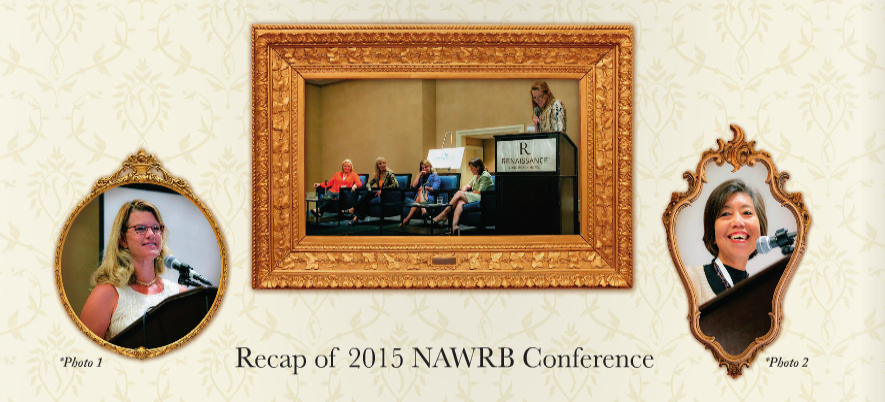The National Association of Women in Real Estate Businesses (NAWRB) held its 2nd Annual Conference, “Historic Diversity and Inclusion Movement,” August 17th-19th in Long Beach, CA. As a testament to our dedication to bring women to the forefront, 84 percent of our speakers were women in executive positions, who shared their best practices, personal stories and business opportunities with the attendees.
Conference workshops were highly engaging, starting with certification training speakers Sylvia Gutierrez of the Small Business Administration (SBA) and Karla Gonzalez of the Small Business Development Center (SBDC). Attendees were encouraged to bring their certification packages and follow step-by-step instructions on the process of applying for a women-owned business certification. Prepaying applicants had the opportunity of submitting their completed certification packages to an onsite NAWRB certification reviewer. As part of the workshop, we also addressed the benefits of certifying as a women-owned business and the ways certification can maximize business growth.
LinkedIn expert Melissa Washington, a Navy veteran, began her workshop by speaking of her background and career struggles. Having been laid off from her corporate job in 2009, Washington turned to LinkedIn for her employment search and eventually began holding workshops at her home. These workshops sparked a remarkable change and Washington now enjoys a successful career as a renowned speaker, author and corporate event professional. Washington spoke to attendees about the best ways of utilizing LinkedIn to expand their outreach and connect themselves and their businesses with decisive opportunities.
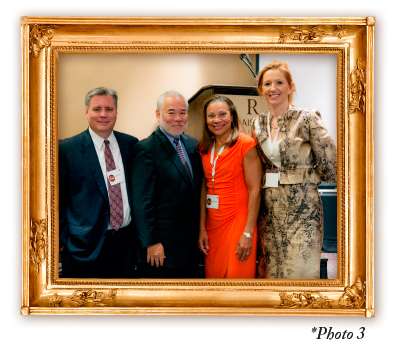
Our “Use Your REO and Corporate Training to Secure Government Contracts” workshop featured NAWRB’s Desirée Patno and Freddie Mac’s Jay Inouye. Attendees were all ears to learn ways of using their existing skill set to capitalize on new business prospects. As the overall volume of REO properties diminishes, so do the business opportunities for the vendors who service them. In an effort to drive vendor business growth, this session demonstrated the process of utilizing their REO and corporate skill set to obtain facility maintenance contracts with the government. Helping utilize existing teams and vendors in this specialized sector is one area on which NAWRB prides its consulting and marketing services.
Our welcome reception kicked off on Monday evening with guests reconnecting with old friends and building new relationships. With representatives from the U.S. Treasury, the Office(s) of Minority and Women Inclusion (OMWI), Government-Sponsored Enterprises (GSEs), the Small Business Administration (SBA) and other great organizations, our kick-off party provided the perfect balance between lighthearted conversation and pivotal interactions.
Tuesday’s opening keynote address was delivered by Yvonne Lee of the SBA’s Office of Advocacy Region IX and provided an update on the most prevalent issues hindering small businesses (photo 2). Lee spoke of the Office of Advocacy’s efforts to eradicate these difficulties through their outreach projects and research. She emphasized the potential of women- and minority-owned businesses as the housing sector and economy improve, and stressed the importance of uniting as a community to promote the success of our nation’s small businesses.
Lee elaborated on the significance of capital for the survival of small businesses and delineated the connection between the housing crisis and the U.S. economy, when countless small businesses began going under as business owners lost their homes. She also emphasized the importance of being proactive and addressing business problems as soon as they become apparent, explaining that if a business lasts more than two years its longevity past five years is usually very good.
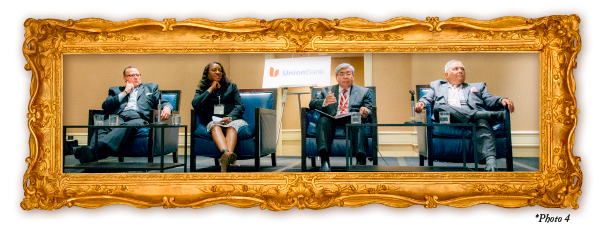
Our “Annual OMWI Update,” featuring OMWI Senior Deputy Director Melodee Brooks of the Federal Deposit Insurance Corporation (FDIC), OMWI Director Stuart Ishimaru of the Consumer Financial Protection Bureau (CFPB) and OMWI Deputy Director Eric Howard of the Federal Housing Finance Agency (FHFA), addressed the current state of the OMWIs and explained to our attendees how this ground-breaking work affects and helps their businesses (photo 3). The directors expressed their excitement about Dodd-Frank and emphasized the need for engagement and promotion of diversity and inclusion to secure progress.
Concerning the interagency policy statement, Brooks stressed the importance of leadership in ensuring accountability due to the fact that the standards lack enforcement. She went on to state that having to
report her progress keeps her accountable and articulated her hope that the statement encourages entities to proactively improve their D&I efforts. Ishimaru also addressed the importance of accountability, and explicated the support that these standards will provide the CFPB in the pursuit of their diversity and inclusion goals. Furthermore, he affirmed that diversity work is often overlooked and that the standards are a success and an opportunity for people to witness the thriving minority and women’s movement.
Recounting the work being done at the FHFA, Howard detailed their recently-released OMWI strategic plan and explained the outlines it provides for the assessment of the agency’s D&I progress. Howard also spoke of the innovative scorecard the FHFA developed for Fannie Mae and Freddie Mac, which for the first time ever includes a diversity and inclusion section. The plan and scorecard are just a few of the initiatives the FHFA has commenced to increase their diversity and inclusion.
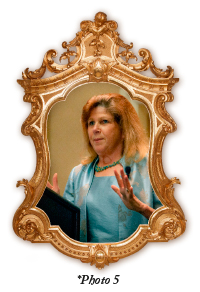
When asked about contracting opportunities, Howard mentioned the FHFA’s much anticipated database and forecast scheduled for release in November and the “Do Business With Us” section on their website; Brooks urged attendees to visit the small business page on the FDIC website and said they are currently looking for everything from IT to janitorial services; Ishimaru instructed attendees to visit the CFPB’s website for forecasts and to find out if there are currently any opportunities they qualify for.
We continued our mission of preparing attendees for the future with our “Supplier Diversity within Regulated Entities” session with panelists Richard Chacon of Union Bank, Jay Inouye of Freddie Mac, Cheryl Travis-Johnson of VRM Mortgage Services and Michael Ruiz of Fannie Mae (photo 4). The session’s hottest topic was the FHFA’s corporate scorecard; the speakers communicated the card’s importance in illuminating the impediments to women and minorities, and emphasized its significance in creating diversity and inclusion. Ruiz affirmed that the scorecard generates a shift from simple compliance to true inclusion, provides visibility and drives accountability.
The panel’s advice to vendors and companies can be expressed in six words: be good at what you do. Our panelists delineated the importance of a succinct 30-second elevator pitch when describing your company’s services, and reiterated that—as Ruiz articulated—they have the power to bring you to the door, but you have the responsibility of getting through it.
Our attendees gained awareness about the effects of the D&I movement and learned the potential for maximizing their products and services with the current diversity opportunities within the regulated entities. Chacon, providing one of the session’s most pertinent remarks, stated, “One way of measuring success is money, but another is by the number of women-and minority-owned suppliers with which you conduct business.” This is the very nature of the success NAWRB strives to accomplish throughout our industry.
The day’s luncheon Keynote address provided an update on TRID from Laurie Maggiano, Servicing and Secondary Markets Program Manager, Office of Research, Markets & Regulations at the CFPB (photo 5). Maggiano’s speech encapsulated the importance of protecting the consumer and expressed the CFPB’s desire that homebuyers purchase the right home and loan for them.
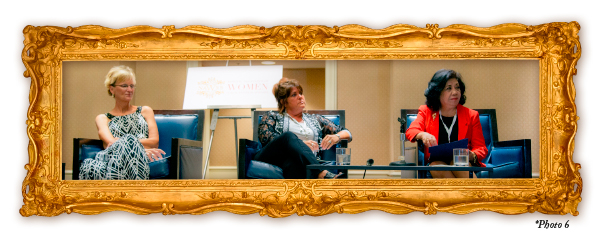
Maggiano provided our guests with five guiding principles to follow when working with clients:
1) Encourage your clients to think through their mortgage sources. Careful consideration is crucial to making sound, informed decisions during life-changing purchases like buying a home.
2) Encourage your clients to apply for more than one loan estimate. This helps them see all of their options and facilitates the process of choosing the best estimate for them.
3) Make sure your clients indicate their intent to proceed after receiving their loan estimate. This is to make sure your client clearly expresses their interest and does not miss out on a good rate.
4) Be the source of information at the transaction. Good communication can prevent so many setbacks. You have the responsibility of being the conduit between your client and all other parties, as they might be starry-eyed at the prospect of their new home and not be appropriately attentive. You need to remain prepared at all times during the home buying process.
5) Find out who will provide the closing disclosure and follow up to ensure your client receives it in a timely manner, at least three days before closing. This ensures the process is as fair and straightforward as possible, preventing any blunders due to hasty decision-making or processes.
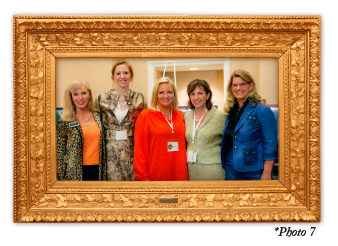
When asked for the reasoning behind TRID by an attendee, Maggiano responded that homebuyers don’t really know what they’re signing and as a result do not understand their problems when they encounter them. She added that this leads to consumers being taken advantage of, and even provided a personal account of a time a lender attempted to swindle her.
Our “Contracting Opportunities” session educated attendees on navigating business opportunities for the good of their businesses, even if it doesn’t necessarily mean dollar signs. Our panelists were Virginia Gomez of the Southern California Minority Supplier Development Council (SCMSDC), Nesa Grider of First Preston HT and Mashell Stith of Field Property Management (photo 6).
When asked about the best way for a new company to build business, our panelists recognized the importance of being good at what you do, establishing a focus and building strong relationships. Grider reiterated the power of modesty and emphasized that even if you do not like someone personally, you must be able to conduct business with him or her for the success of your company.
Our speakers restated the power and ability of certification to open doors for businesses. Gomez took the time to remind guests that as useful as it is, certification can never replace the ability to actually perform the service your business advertises.
One of our conference’s highlights featured an inspiring panel of powerhouse women: Rebecca Steele, Executive VicePresident of Community Blight Solutions and SecureView, LLC.; Amy Schumacher, COO of Prospect Mortgage; Irma Delgado-Trikas, President and CEO of Arista National Title; Linda Craft, CEO of Linda Craft & Team, Realtors, who shared their stories of success and confirmed the truth that success, when it comes, does so as a result of dedicated hard work (photo 7).
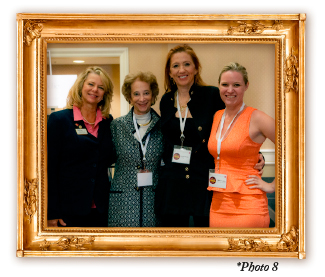
Trikas began her career in the sale of industrial adhesives and now runs a successful title and escrow company. Steele began in chemical engineering with the dream of creating something really important; she eventually went into mortgage working for Countrywide, JPMorgan Chase and Bank of America, and started three consulting companies. Craft’s first job was as an ice cream truck driver when she was 16, eventually going into pharmaceuticals and opening a health store. In 1985, after her father died and her marriage ended, Craft entered real estate with an incredible drive and made a success of herself. Schumacher started her career as a lawyer before entering the mortgage industry. She has operated and owned several companies including a record label, a software company and an aerospace company.
Steele endowed our attendees with one of the session’s most trenchant pieces of advice, “Every time there’s a tough problem women are tapped on the shoulder to run to the fire. They are the most dangerous [problems], they are the most difficult, and you, like me, are courageous and you’re going to run there. Run there smarter, better, and bring people with you instead of trying to do it alone.” Our panel of powerhouse women communicated the truth that career, like life, is a journey, and you can enter and succeed within any industry if you are passionate and hard-working. All work and no play is no way to live, and our Roaring Twenty Awards Gala capped off Tuesday night as we celebrated 20 of housing’s leading women with a live band and a silent auction. The conference guests mingled and danced the night away after unwinding from a full day of enlightening sessions.
Wednesday’s opening Keynote address featured Rebecca Steele unveiling her career and the initiatives she has originated to help women (photo 1). Steele told the story about her arrival at Countrywide, soon after which she realized there was essentially no human resources department within the company. She decided to pull together women in management positions to hear their stories and see how she could help them, but only 10 of the 100 women invited attended the meeting. She was astonished by the number of women who did not take her or the unity she was striving to create seriously.
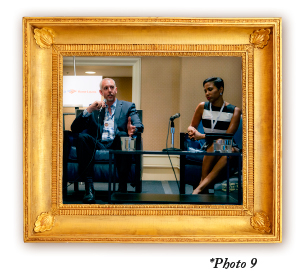
Nevertheless, Steele remained strong and dedicated; she told our attendees, “As important as it is to me to be successful in business, I don’t think I will be as successful unless I have a great following of great leaders, great women, and have diversity and inclusion as a part of my mission.”
It was the reiteration of this commitment to the D&I movement with which Steele ended her speech, “I never cared about how much money I made, and I still don’t today. I want to make a difference, and I want to do good work, and I want to do important work.”
To highlight collaborative women’s organizations and the ways they are expanding their opportunities to achieve a greater platform for women, our “Women Organizations—Synergized” session featured panelists Sherri Souza from the Women’s Council of Realtors (WCR), Hillary Gadsby of Ellevate, NAWRB’s own Desirée Patno and Lynn Bunim from Women Impacting Public Policy (WIPP) (photo 8). The point of this panel was to illustrate how women can help each other and pool resources. Our panelists described the initiatives and work their organizations are conducting, and NAWRB showcased how working together strengthens the women’s culture; this is our mission and purpose of everything we do.
We enlisted the help of Telebah Woods from Bank of America and Sean McDowell from Prospect Mortgage with the goal of educating attendees on the specialties of financial institutions (photo 9). Our panelists spoke about their products and services, how different they are and how each can best serve industry needs. Speaking of their respective companies, Woods and McDowell had a sense of friendly competition but were clear about their commitment to developing programs that best serve the consumer.
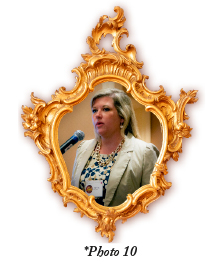
The dynamics have changed; it is no longer a matter of companies demanding consumers’ money. The consumer now has the power to ask what can be done to make things better for them and win their business. Our speakers elucidated that the whole mystery behind signing loans is gone, now that people have come to understand the process better. Consumers know what they are getting and giving.
Our keynote luncheon featured the work and developments of the City of Hope. Amy M. Cook spoke of the revolutionary work being conducted with Type 1 diabetes (photo 10). City of Hope began work in 2001 to help Type 1 diabetes patients create insulin through new islets, either by taking islets from one person or growing generated islets, and injecting them into a patient. In 2004, they conducted the first islet transplantation into a person, and discovered that islets can be placed into other organs, not just the pancreas. City of Hope has patients that have been off any external insulin treatments for 10 years, and they are helping change the way that Type 1 diabetics deal with their disease.
Cook also spoke of positivity and the benefits to having an optimistic outlook. She explained to our audience that individuals who demonstrate happiness as a predominant mood have: a lower risk of heart disease, lower blood pressure, more normal weight, healthier blood fat profiles and a stronger ability to deflect stress.
Cook affirmed that among individuals of age 60 and over, feelings of happiness and enjoyment are associated with improved mobility and a lower risk of developing a disability, and that when exposed to cold and flu viruses, happier people are at lower risks of getting sick. She also emphasized the importance of gratitude—stating that grateful people report having more positive emotions and are happier with their lives—and its expression, “Having gratitude and not expressing it is like wrapping a present and not giving it.”
Our guests learned about prominent health issues and became equipped with the knowledge necessary to react appropriately and in a timely manner should they encounter one of these conditions.
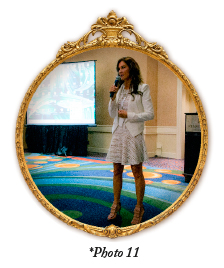
Renowned lifestyle coach Allison Maslan was our conference’s final guest speaker (photo 11). Maslan stressed the importance of confidence and dedication to the success of your business and enjoyment of life. She addressed efficiency and told our attendees that if they can pay somebody to do the work they are doing then they are losing money. The reasoning behind this is that as the expert, your time is the most valuable. Paying somebody to do your work would allow you to focus on other avenues of revenue, which only you are equipped to maneuver.
Maslan also gave interview advice: she advised interviewing three people and utilizing a 90-day trial upon hiring a candidate. She advocated against giving employees a small work load at the start of their employment, asserting that loading them up with work from the beginning will show if they can handle the environment and whether or not they are suited for the needs of your company. Maslan divulged that this is how she runs her business and that good workers pay for themselves.
With this advice, the 2015 NAWRB Conference came to a close. Our intimate conference provided all attendees the access and opportunity to speak with important decision makers, people who make the policies that ultimately affect housing in the long run. This is what is special about NAWRB; we connect our guests with the leaders affecting the future of the industry, and provide them a platform to make their voices heard. We not only provide an avenue for business growth, we are also the voice for the issues, accomplishments and needs of our community.

As with all our efforts, our conference was focused on bringing women to the forefront of the housing industry and helping them succeed, a mission we will continue to carry out throughout this exciting and historic period in our industry.
To view the original article please see our magazine titled “Economic Growth” Vol 4, Issue 5 by Clicking Here

 Login
Login

